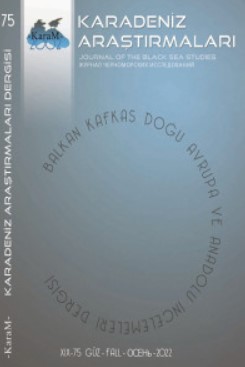SABAHATTİN ALİ’NİN “HASANBOĞULDU” HİKÂYESİNDEKİ ÇATIŞMALAR ÜZERİNE BİR İNCELEME
A STUDY ON THE CONFLICTS IN THE STORY OF "HASANBOĞULDU" OF SABAHATTIN ALI
Author(s): Öznur ÖzdariciSubject(s): Turkish Literature, Theory of Literature
Published by: Karadeniz Araştırmaları Merkezi
Keywords: Sabahattin Ali; “Hasan Boğuldu”; Plot; Conflicts;
Summary/Abstract: Sabahattin Ali is one of modern Turkish literature’s most influential authors – with many a novel, short story, poem, and play to his name. 20th century Turkish prose largely focuses on stories about [rural] Anatolian Turks alongside their fondness for nature, and generally in lyrical, lively, and plain language. Ali’s stories are more human centred. He frequently studied how people lived, worked, and behaved, and set the plot around a specific event or chain of events. In this study, we shall examine "Hasanboğuldu" – one of a series of thirteen short stories published in 1943 under the title “Yeni Dünya.” Well received and even the subject of a film, it is peppered folkloric elements that hail from Turkey’s deeply rooted oral tradition. That noted, we plan to discuss the conflicts in the story, and argue how important a role they play structurally in the overall narrative. Interestingly, those conflicts fall under one of four categories: person-person, person-society, person-space, and conflict with oneself.
Journal: Karadeniz Araştırmaları
- Issue Year: 2022
- Issue No: 75
- Page Range: 965-974
- Page Count: 10
- Language: Turkish

